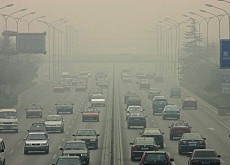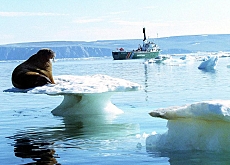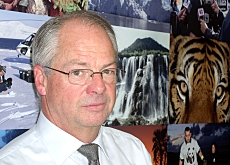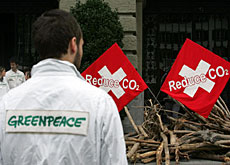Climate treaty gets second wind

Environment ministers have agreed to a road map to extend the Kyoto Protocol climate pact beyond 2012, breaking two weeks of deadlock in Montreal.
More than 150 nations, including Switzerland, agreed early on Saturday to launch formal talks on mandatory post-2012 reductions in greenhouse gases.
These talks will include Kyoto outsiders such as the United States and developing nations. Washington had long resisted taking part in the talks.
However, days of backroom bargaining at the United Nations conference had weakened the proposal presented to the Americans to the point of saying that the “dialogue” over future actions “will not open any negotiations leading to new commitments”.
The US, the world’s biggest emitter, pulled out of Kyoto in 2001, denouncing it as an economic straitjacket.
However, delegates were buoyed on Friday by Bill Clinton, a Kyoto supporter, who told them in a speech punctuated by enthusiastic applause that President Bush’s economic argument against the protocol was “flat wrong”.
Leadership
The agreement on a Kyoto renewal road map gives members seven years to negotiate and ratify accords by the time the first phase ends in 2012. Most countries agree that deeper cuts will be needed to avoid climate chaos in coming decades.
But developing countries, such as China and India, have no targets under Kyoto and say that rich industrial states – having fuelled their economies with coal, oil and gas since the Industrial Revolution – have to take the lead in cutting emissions.
“These countries are willing to take the leadership,” Bruno Oberle, director of the Swiss environment agency and head of the Swiss ministerial delegation to Montreal, said of the Kyoto nations. “But they are not able to solve the problem. We need the support of the United States – but also of the big emerging countries.”
Oberle told swissinfo that “Switzerland would have preferred it if the picture could have been a bit clearer about what happens after Kyoto”.
“Now we have a half-full, half-empty glass in the sense that the parties are ready to talk to one another but it is not yet clear to what extent the international community is willing to work on something together.”
However, the Canadian conference president, Environment Minister Stephane Dion, said the decisions amounted to “a map for the future”.
Alive and kicking
Environmentalists were also upbeat about the plan to negotiate “second-phase” emissions cuts.
“The Kyoto Protocol is alive and kicking,” said Jennifer Morgan, a climate change expert at environmental group WWF.
“There were many potential points at this meeting when the world could have given up due to the tactics of the Bush administration and others but it did not,” she said.
Alexander Hauri, a climate expert at Greenpeace Switzerland, told swissinfo: “On a national level, [Switzerland’s] priority is to fulfil the Kyoto commitments. If you do your homework, you can also ask the others to do their homework.”
Hauri said the pressure is increasing as everybody realises that climate change is happening.
“There are measures we can use, like alternative energy and energy efficiency. We have the solutions; we just have to use them.”
He added: “One more important point is that if the US continues to work so hard against all these opportunities, the other countries should have the courage to move on without them.”
swissinfo
Industrialised countries committed themselves to reducing greenhouse gases in Kyoto in 1997.
The Kyoto Protocol calls for industrialised nations to reduce harmful emissions by an average 5.2% by 2012.
The Swiss parliament ratified the Kyoto Protocol in June 2003.
Under Kyoto, Switzerland has pledged to reduce carbon dioxide emissions from fossil fuels to 10% below 1990 levels by 2010.
It has also pledged to cut emissions by 1.8 million tons a year between 2008 and 2012.
The UN Climate Change Conference took place in Montreal from November 28 to December 10.
Some 7,000 delegates and observers from 189 countries discussed how countries can work together to address global warming.
More than 150 nations, including Switzerland, agreed to launch formal talks on mandatory post-2012 reductions in greenhouse gases.
The Montreal meeting was the first of the annual climate conferences since the Kyoto Protocol took effect last February, mandating specific cutbacks in emissions of carbon dioxide and five other gases by 2012 in 35 industrialised countries.

In compliance with the JTI standards
More: SWI swissinfo.ch certified by the Journalism Trust Initiative



You can find an overview of ongoing debates with our journalists here . Please join us!
If you want to start a conversation about a topic raised in this article or want to report factual errors, email us at english@swissinfo.ch.